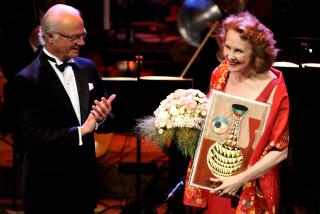Playing to Emotions : Kitaro brings his New Age blend of rock, classical and folk to Universal Amphitheatre.
- Share via
UNIVERSAL CITY — The road can be a challenging place for a musician. The blur of hotel rooms, bumpy roads, that long, endless bus trip. Which may explain why many New Age artists never step outside their studios.
For Kitaro, who is listed in the Encyclopaedia Britannica as “the quintessential musician of the New Age,” staying home and indoors is unacceptable. “Most of the artists never perform live,” Kitaro complains of his New Age colleagues. “That is a problem. It is the artist’s responsibility to perform, to communicate with the audience.”
So Kitaro travels. The Japanese-born composer and instrumentalist expects to be on the road with his nine-person band until May of next year, performing a two-hour-and-20-minute concert virtually every night. Kitaro and band, who perform tonight at Universal Amphitheatre, mix older selections with material from his new “Mandala” album.
But on this quiet afternoon in Los Angeles, Kitaro has the day off. He’s sitting for lunch and an interview at his Century City hotel. “Today is nice, relaxed,” he says with a smile. Or, maybe it would be, he says with a shrug, if not for his appointment with the dentist later in the day.
“Anytime I go to a new country, it’s very important to me,” Kitaro says. Before this trip is over, Kitaro will have traveled throughout the United States, Canada, Australia, Southeast Asia and Europe. He will also make his first tour of South America. “I find different experiences and inspirations.”
The United States is hardly new territory for Kitaro, who now lives outside Boulder, Colo. His first tour of the country was in 1987, when he decided to use the long bus ride to search for a place to live. He mulled over Seattle and parts of Massachusetts before choosing his new home at the base of a mountain, where he is building a private studio.
“I needed mountains, a higher altitude,” he says, noting that nature is an important element and inspiration for his work. “I needed four seasons, to watch the leaves changing colors.”
*
Kitaro, born in 1953, says he ultimately had to leave Japan and what he described as the small, closed society of musicians there. He needed to expand beyond that small world and collaborate with other types of musicians. “If I stayed in Japan I could not go deeper with my creativity,” he explains. “They try to keep in their own world. In the United States there are many more categories of music.”
The category he seems least comfortable with is New Age, which remains a mystery to him. “Who came up with this name?” he asks. It seems to have little to do with the layers of rousing, emotional music he creates with elements of rock, classical and various international folk styles. His early dual inspirations were rock-soul singers such as Otis Redding and the modern synthesizer masters of Tangerine Dream. “My dream is a kind of rock symphony,” he says.
Among the pleasant opportunities Kitaro found in the United States was a job creating the musical score for Oliver Stone’s 1993 film “Heaven and Earth.” It was the composer’s first work on a major Hollywood film, and it earned him a Golden Globe Award. “Heaven and Earth” was the final chapter in Stone’s trilogy on the Vietnam War and focused on the experiences of Vietnamese War survivor Le Ly Hayslip.
“I learned many things from Mr. Stone about the Vietnam War,” says Kitaro, who accompanied the director on a two-week trip to Vietnam before shooting. “He didn’t like the typical Hollywood score. I thought that’s why he chose me. He wanted an Asian spirit.”
Composing and recording that score took Kitaro more than a year of work with Stone. In search of the authentic cultural flavor, Kitaro brought three Vietnamese musical instruments into the studio, even though he didn’t know how to play them. Kitaro taught himself, as he has for guitar, keyboards and other instruments.
“Looking for sounds is enjoyable, sometimes troubling,” he says.
The new “Mandala” album opens to the sound of water drops, blending into Kitaro’s soaring electric guitar playing. Although keyboards are an important part of Kitaro’s arsenal, he prefers the old synthesizers introduced in the 1960s. He’s unimpressed with the new keyboard technology.
“These keyboard technologies are destroying artists’ creativity,” he says. “People don’t know the real sounds.”
Where and When
Who: Kitaro.
Location: Universal Amphitheatre, 100 Universal City Plaza, Universal City.
Hours: 8:15 tonight.
Price: $22 to $35.
Call: (818) 980-9421.
More to Read
The biggest entertainment stories
Get our big stories about Hollywood, film, television, music, arts, culture and more right in your inbox as soon as they publish.
You may occasionally receive promotional content from the Los Angeles Times.










